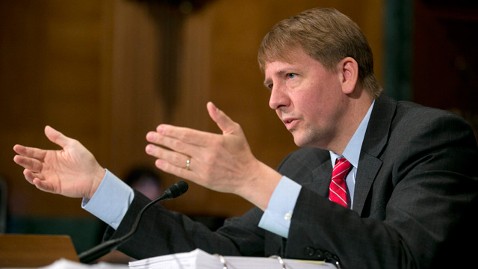With Cordray Nomination, Obama Renews Fight With GOP

(Image Credit: Andrew Harrer/Bloomberg via Getty Images)
Four days into his second term, President Obama renewed a fight from his first term when he renominated Richard Cordray for head of the Consumer Financial Protection Bureau.
At a news conference this afternoon, Obama announced he was throwing Cordray, the man currently serving in the post thanks to a recess appointment, into the ring as his pick to direct the government-run financial watchdog.
"He can't stay on the job unless the Senate finally gives him the confirmation he deserves," Obama said.
A year and a half ago, Obama passed over Elizabeth Warren to nominate Cordray for the same position, a move that some saw as an affront to Warren, now the junior senator from Massachusetts, who is credited with coming up with the idea for the CFPB.
But the real controversy came as Republicans repeatedly blocked Cordray's nomination. After six months of partisan bickering in Congress and all rule-making brought to a standstill at the CFBP, Obama invoked executive authority to put Cordray in place.
For such an appointment to be legal, the Senate had to be out of session. Anticipating questions about the constitutionality of Cordray's recess appointment, White House spokesman Dan Pfeiffer pre-emptively defended Obama's action, attacking Republicans' use of pro-forma sessions of the Senate as "gimmicks" designed to keep Cordray out of office.
"But gimmicks do not override the president's constitutional authority to make appointments to keep the government running," Pfeiffer wrote in the White House blog. "In fact, the lawyers who advised President Bush on recess appointments wrote that the Senate cannot use sham 'pro forma' sessions to prevent the president from exercising a constitutional power."
Despite challenges to his appointment, Cordray took the helm of the organization created by the Dodd-Frank Wall Street Reform and Consumer Protection Act to regulate how lending works for big companies in America.
Several parties are involved in an ongoing lawsuit challenging the constitutionality of Cordray's appointment. In November, the government filed to dismiss the case, according to Adam White, one of the lawyers for the plaintiffs.
"His being renominated doesn't affect the case," White said of Cordray.
The CFPB has played into the Obama team's narrative that he is the president who fights for middle-class families. One of Cordray's first acts as director was to star in a video asking Americans to submit their stories of dealing with credit card companies, lenders and mortgage brokers.
Under Cordray's lead, the CFPB has refunded $425 million to consumers from big- name credit card companies, including American Express, Capitol One and Discover.
Last week, the organization announced new rules to discourage lenders from pushing high-risk loans.
Diane Katz, a regulatory policy expert from the Heritage Foundation, a conservative think tank, called the CFPB "one of the most powerful - and unaccountable - federal agencies ever created" in this week's edition of Heritage's Backgrounder publication.
"Basically, Cordray has a free hand," Katz told ABC News before the announcement Thursday. "He is not answerable to Congress in terms of the agency's budget being independent; he doesn't answer to the white house directly; nor does the Federal Reserve have much authority to intervene in bureau affairs."
She said the constitutionality of Cordray's appointment is still at issue and will likely come up during the confirmation process.
If Congress again chooses not to confirm Obama's nominee, Cordray's term will expire at the end of the year. Some have speculated Cordray would then leave the agency and enter the governor's race in his home state of Ohio.
Cordray's No. 2 man at the CFPB, Raj Date, is expected to leave his post a week from today. As of noon, they still had not announced who would replace him.